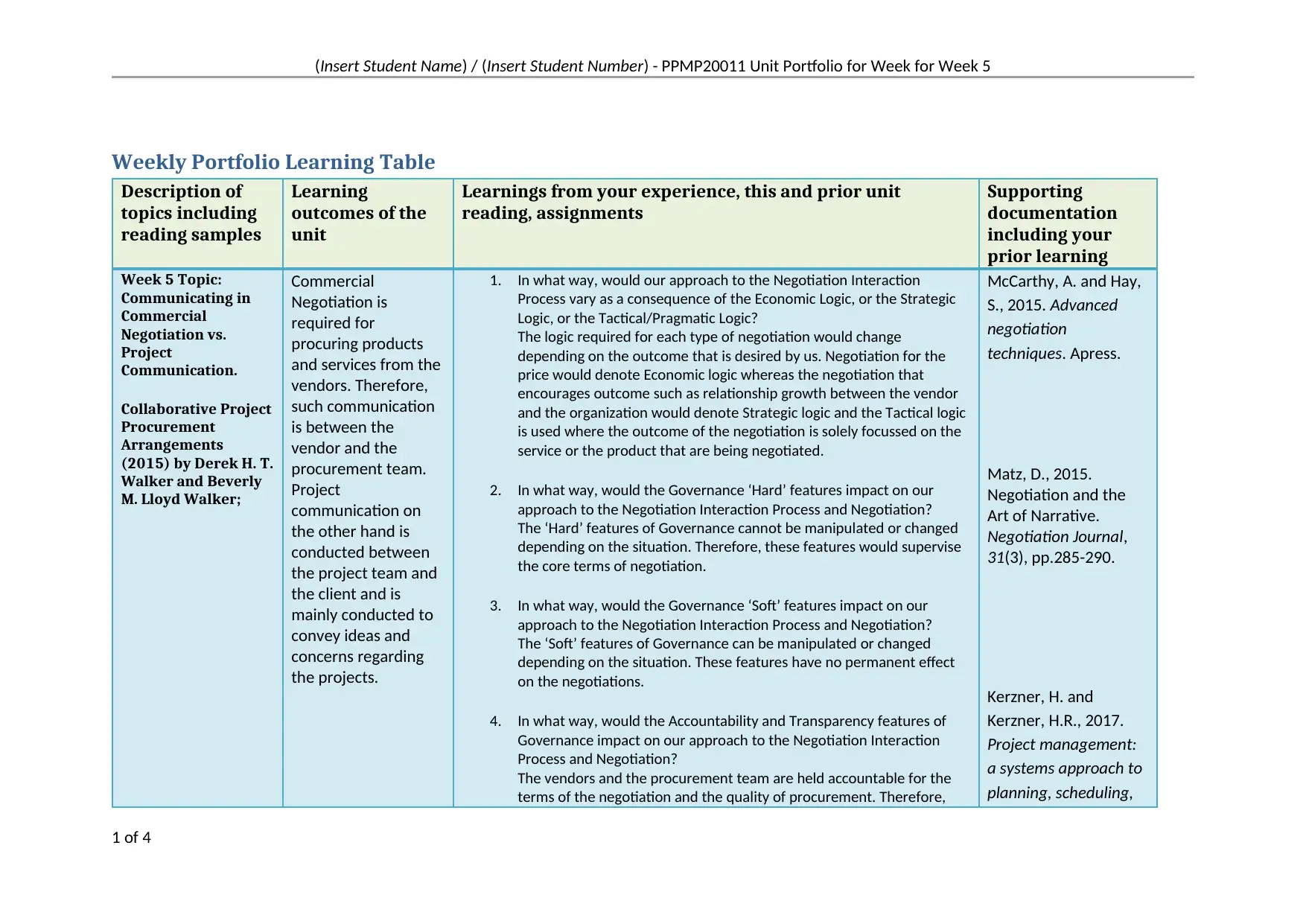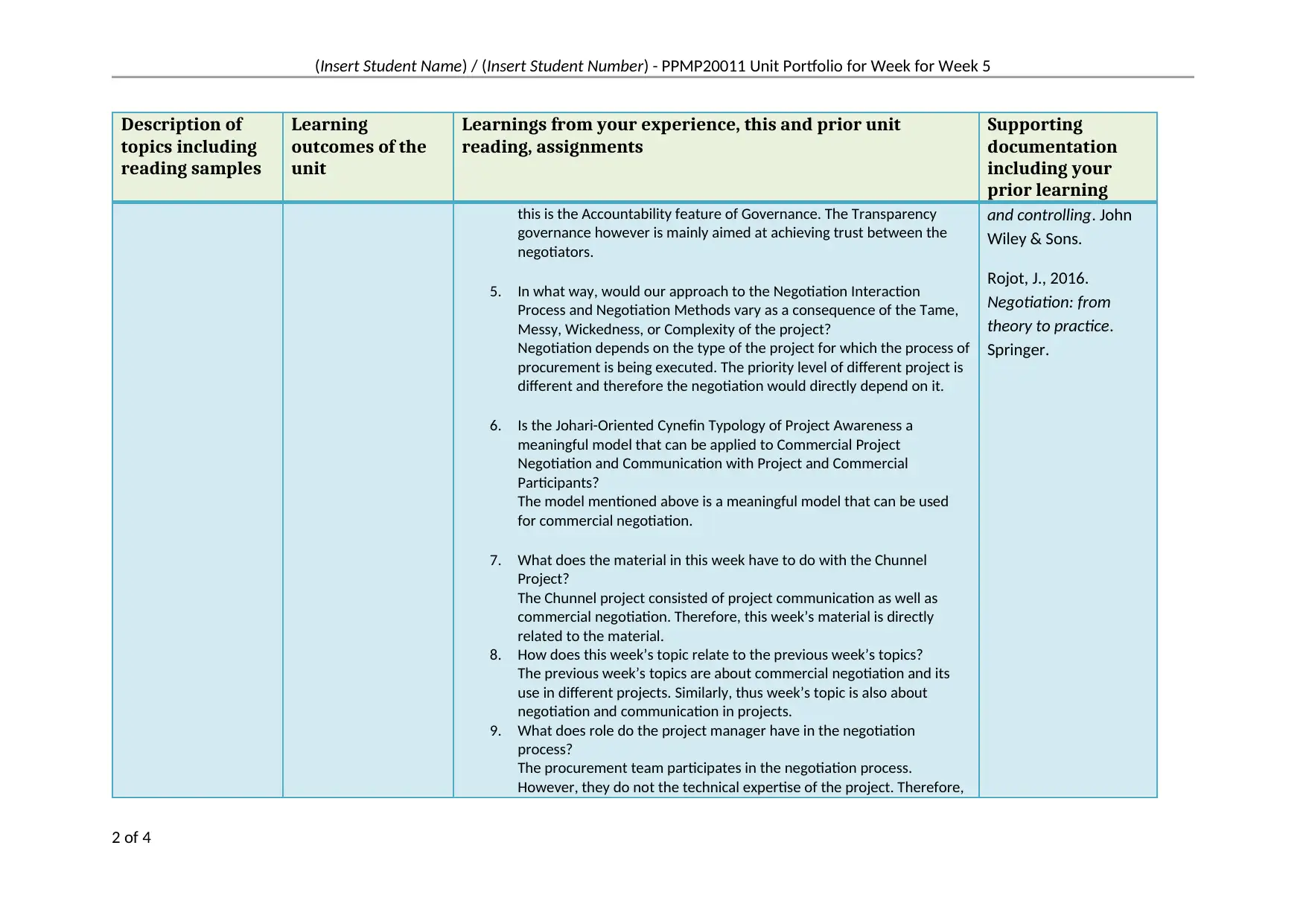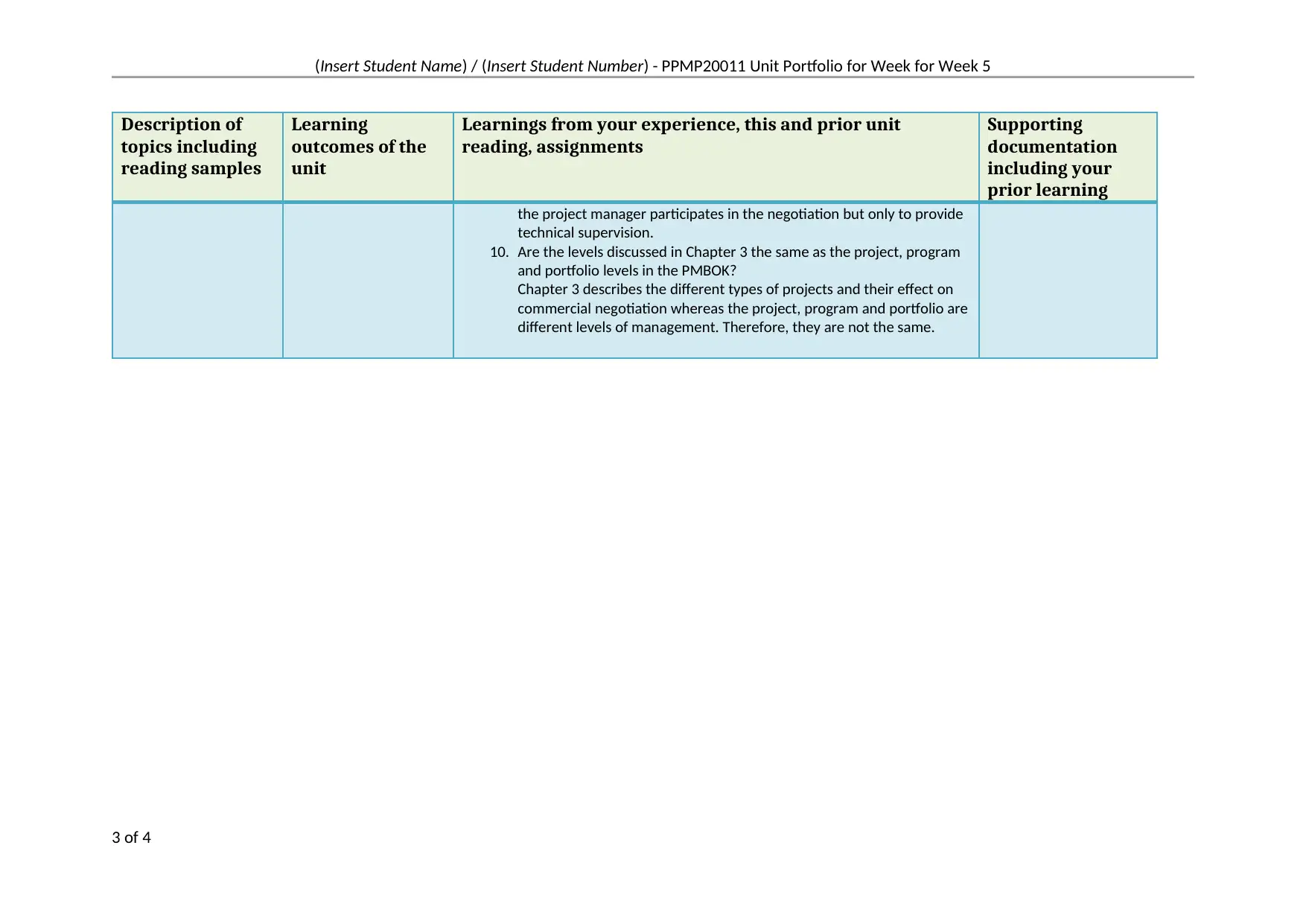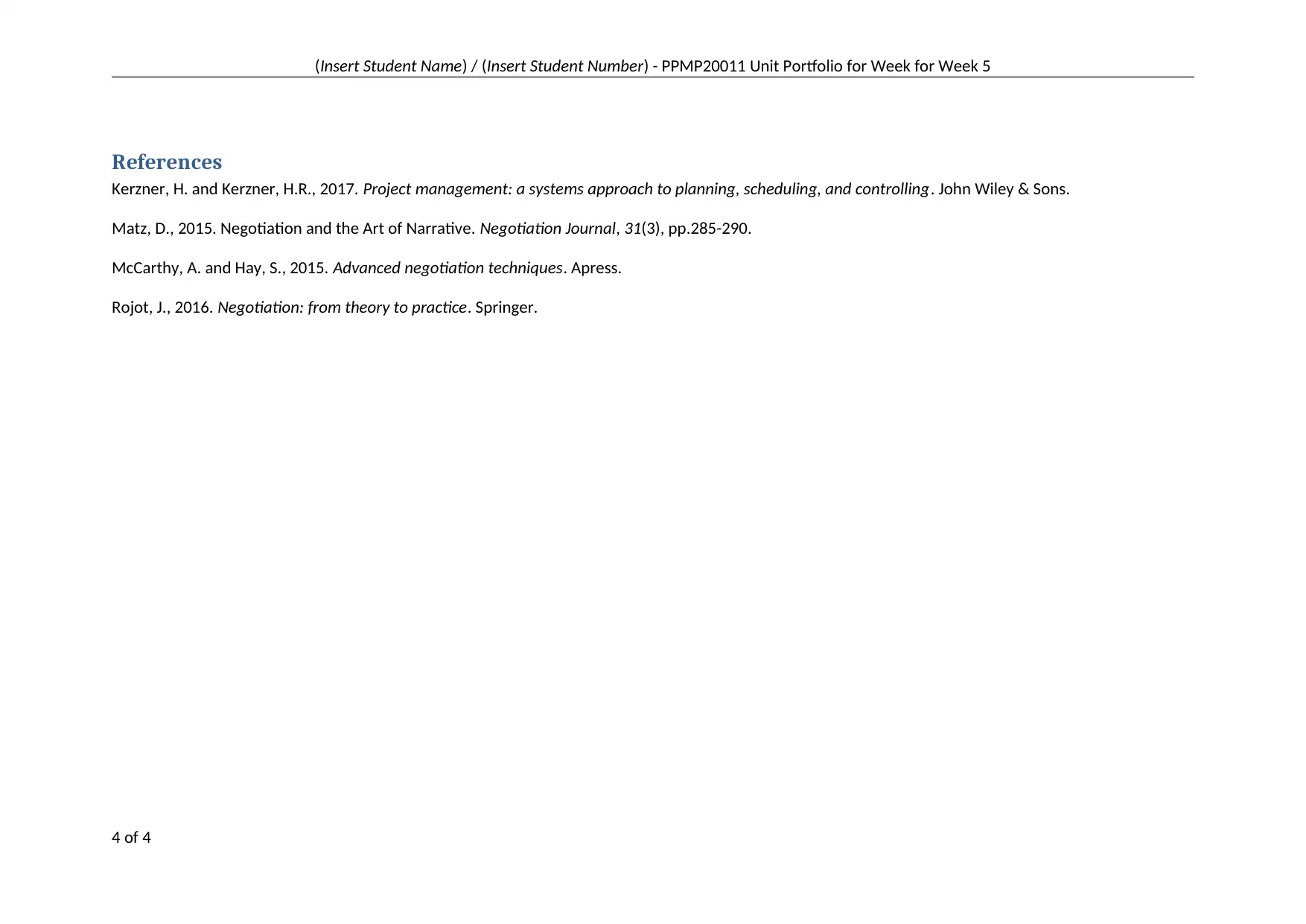PPMP20011 Unit Portfolio Week 5: Commercial Negotiation and Projects
VerifiedAdded on 2021/04/17
|4
|893
|29
Homework Assignment
AI Summary
This portfolio assignment, part of the PPMP20011 unit, focuses on the differences between commercial negotiation and project communication. It explores how economic, strategic, and tactical logics influence negotiation strategies, examining the impact of governance (both 'hard' and 'soft' features) and accountability/transparency on the negotiation process. The assignment also considers how the project's nature (tame, messy, wicked, or complex) affects negotiation methods. Furthermore, it assesses the applicability of the Johari-Oriented Cynefin Typology to commercial negotiation, relates the week's material to the Chunnel Project, and compares the week's topics to previous ones. The role of the project manager in the negotiation process is also analyzed, and the differences between the levels discussed in Chapter 3 and the PMBOK levels are clarified. The assignment includes references to relevant academic sources.

(Insert Student Name) / (Insert Student Number) - PPMP20011 Unit Portfolio for Week for Week 5
Weekly Portfolio Learning Table
Description of
topics including
reading samples
Learning
outcomes of the
unit
Learnings from your experience, this and prior unit
reading, assignments
Supporting
documentation
including your
prior learning
Week 5 Topic:
Communicating in
Commercial
Negotiation vs.
Project
Communication.
Collaborative Project
Procurement
Arrangements
(2015) by Derek H. T.
Walker and Beverly
M. Lloyd Walker;
Commercial
Negotiation is
required for
procuring products
and services from the
vendors. Therefore,
such communication
is between the
vendor and the
procurement team.
Project
communication on
the other hand is
conducted between
the project team and
the client and is
mainly conducted to
convey ideas and
concerns regarding
the projects.
1. In what way, would our approach to the Negotiation Interaction
Process vary as a consequence of the Economic Logic, or the Strategic
Logic, or the Tactical/Pragmatic Logic?
The logic required for each type of negotiation would change
depending on the outcome that is desired by us. Negotiation for the
price would denote Economic logic whereas the negotiation that
encourages outcome such as relationship growth between the vendor
and the organization would denote Strategic logic and the Tactical logic
is used where the outcome of the negotiation is solely focussed on the
service or the product that are being negotiated.
2. In what way, would the Governance ‘Hard’ features impact on our
approach to the Negotiation Interaction Process and Negotiation?
The ‘Hard’ features of Governance cannot be manipulated or changed
depending on the situation. Therefore, these features would supervise
the core terms of negotiation.
3. In what way, would the Governance ‘Soft’ features impact on our
approach to the Negotiation Interaction Process and Negotiation?
The ‘Soft’ features of Governance can be manipulated or changed
depending on the situation. These features have no permanent effect
on the negotiations.
4. In what way, would the Accountability and Transparency features of
Governance impact on our approach to the Negotiation Interaction
Process and Negotiation?
The vendors and the procurement team are held accountable for the
terms of the negotiation and the quality of procurement. Therefore,
McCarthy, A. and Hay,
S., 2015. Advanced
negotiation
techniques. Apress.
Matz, D., 2015.
Negotiation and the
Art of Narrative.
Negotiation Journal,
31(3), pp.285-290.
Kerzner, H. and
Kerzner, H.R., 2017.
Project management:
a systems approach to
planning, scheduling,
1 of 4
Weekly Portfolio Learning Table
Description of
topics including
reading samples
Learning
outcomes of the
unit
Learnings from your experience, this and prior unit
reading, assignments
Supporting
documentation
including your
prior learning
Week 5 Topic:
Communicating in
Commercial
Negotiation vs.
Project
Communication.
Collaborative Project
Procurement
Arrangements
(2015) by Derek H. T.
Walker and Beverly
M. Lloyd Walker;
Commercial
Negotiation is
required for
procuring products
and services from the
vendors. Therefore,
such communication
is between the
vendor and the
procurement team.
Project
communication on
the other hand is
conducted between
the project team and
the client and is
mainly conducted to
convey ideas and
concerns regarding
the projects.
1. In what way, would our approach to the Negotiation Interaction
Process vary as a consequence of the Economic Logic, or the Strategic
Logic, or the Tactical/Pragmatic Logic?
The logic required for each type of negotiation would change
depending on the outcome that is desired by us. Negotiation for the
price would denote Economic logic whereas the negotiation that
encourages outcome such as relationship growth between the vendor
and the organization would denote Strategic logic and the Tactical logic
is used where the outcome of the negotiation is solely focussed on the
service or the product that are being negotiated.
2. In what way, would the Governance ‘Hard’ features impact on our
approach to the Negotiation Interaction Process and Negotiation?
The ‘Hard’ features of Governance cannot be manipulated or changed
depending on the situation. Therefore, these features would supervise
the core terms of negotiation.
3. In what way, would the Governance ‘Soft’ features impact on our
approach to the Negotiation Interaction Process and Negotiation?
The ‘Soft’ features of Governance can be manipulated or changed
depending on the situation. These features have no permanent effect
on the negotiations.
4. In what way, would the Accountability and Transparency features of
Governance impact on our approach to the Negotiation Interaction
Process and Negotiation?
The vendors and the procurement team are held accountable for the
terms of the negotiation and the quality of procurement. Therefore,
McCarthy, A. and Hay,
S., 2015. Advanced
negotiation
techniques. Apress.
Matz, D., 2015.
Negotiation and the
Art of Narrative.
Negotiation Journal,
31(3), pp.285-290.
Kerzner, H. and
Kerzner, H.R., 2017.
Project management:
a systems approach to
planning, scheduling,
1 of 4
Paraphrase This Document
Need a fresh take? Get an instant paraphrase of this document with our AI Paraphraser

(Insert Student Name) / (Insert Student Number) - PPMP20011 Unit Portfolio for Week for Week 5
Description of
topics including
reading samples
Learning
outcomes of the
unit
Learnings from your experience, this and prior unit
reading, assignments
Supporting
documentation
including your
prior learning
this is the Accountability feature of Governance. The Transparency
governance however is mainly aimed at achieving trust between the
negotiators.
5. In what way, would our approach to the Negotiation Interaction
Process and Negotiation Methods vary as a consequence of the Tame,
Messy, Wickedness, or Complexity of the project?
Negotiation depends on the type of the project for which the process of
procurement is being executed. The priority level of different project is
different and therefore the negotiation would directly depend on it.
6. Is the Johari-Oriented Cynefin Typology of Project Awareness a
meaningful model that can be applied to Commercial Project
Negotiation and Communication with Project and Commercial
Participants?
The model mentioned above is a meaningful model that can be used
for commercial negotiation.
7. What does the material in this week have to do with the Chunnel
Project?
The Chunnel project consisted of project communication as well as
commercial negotiation. Therefore, this week’s material is directly
related to the material.
8. How does this week’s topic relate to the previous week’s topics?
The previous week’s topics are about commercial negotiation and its
use in different projects. Similarly, thus week’s topic is also about
negotiation and communication in projects.
9. What does role do the project manager have in the negotiation
process?
The procurement team participates in the negotiation process.
However, they do not the technical expertise of the project. Therefore,
and controlling. John
Wiley & Sons.
Rojot, J., 2016.
Negotiation: from
theory to practice.
Springer.
2 of 4
Description of
topics including
reading samples
Learning
outcomes of the
unit
Learnings from your experience, this and prior unit
reading, assignments
Supporting
documentation
including your
prior learning
this is the Accountability feature of Governance. The Transparency
governance however is mainly aimed at achieving trust between the
negotiators.
5. In what way, would our approach to the Negotiation Interaction
Process and Negotiation Methods vary as a consequence of the Tame,
Messy, Wickedness, or Complexity of the project?
Negotiation depends on the type of the project for which the process of
procurement is being executed. The priority level of different project is
different and therefore the negotiation would directly depend on it.
6. Is the Johari-Oriented Cynefin Typology of Project Awareness a
meaningful model that can be applied to Commercial Project
Negotiation and Communication with Project and Commercial
Participants?
The model mentioned above is a meaningful model that can be used
for commercial negotiation.
7. What does the material in this week have to do with the Chunnel
Project?
The Chunnel project consisted of project communication as well as
commercial negotiation. Therefore, this week’s material is directly
related to the material.
8. How does this week’s topic relate to the previous week’s topics?
The previous week’s topics are about commercial negotiation and its
use in different projects. Similarly, thus week’s topic is also about
negotiation and communication in projects.
9. What does role do the project manager have in the negotiation
process?
The procurement team participates in the negotiation process.
However, they do not the technical expertise of the project. Therefore,
and controlling. John
Wiley & Sons.
Rojot, J., 2016.
Negotiation: from
theory to practice.
Springer.
2 of 4

(Insert Student Name) / (Insert Student Number) - PPMP20011 Unit Portfolio for Week for Week 5
Description of
topics including
reading samples
Learning
outcomes of the
unit
Learnings from your experience, this and prior unit
reading, assignments
Supporting
documentation
including your
prior learning
the project manager participates in the negotiation but only to provide
technical supervision.
10. Are the levels discussed in Chapter 3 the same as the project, program
and portfolio levels in the PMBOK?
Chapter 3 describes the different types of projects and their effect on
commercial negotiation whereas the project, program and portfolio are
different levels of management. Therefore, they are not the same.
3 of 4
Description of
topics including
reading samples
Learning
outcomes of the
unit
Learnings from your experience, this and prior unit
reading, assignments
Supporting
documentation
including your
prior learning
the project manager participates in the negotiation but only to provide
technical supervision.
10. Are the levels discussed in Chapter 3 the same as the project, program
and portfolio levels in the PMBOK?
Chapter 3 describes the different types of projects and their effect on
commercial negotiation whereas the project, program and portfolio are
different levels of management. Therefore, they are not the same.
3 of 4
⊘ This is a preview!⊘
Do you want full access?
Subscribe today to unlock all pages.

Trusted by 1+ million students worldwide

(Insert Student Name) / (Insert Student Number) - PPMP20011 Unit Portfolio for Week for Week 5
References
Kerzner, H. and Kerzner, H.R., 2017. Project management: a systems approach to planning, scheduling, and controlling. John Wiley & Sons.
Matz, D., 2015. Negotiation and the Art of Narrative. Negotiation Journal, 31(3), pp.285-290.
McCarthy, A. and Hay, S., 2015. Advanced negotiation techniques. Apress.
Rojot, J., 2016. Negotiation: from theory to practice. Springer.
4 of 4
References
Kerzner, H. and Kerzner, H.R., 2017. Project management: a systems approach to planning, scheduling, and controlling. John Wiley & Sons.
Matz, D., 2015. Negotiation and the Art of Narrative. Negotiation Journal, 31(3), pp.285-290.
McCarthy, A. and Hay, S., 2015. Advanced negotiation techniques. Apress.
Rojot, J., 2016. Negotiation: from theory to practice. Springer.
4 of 4
1 out of 4
Related Documents
Your All-in-One AI-Powered Toolkit for Academic Success.
+13062052269
info@desklib.com
Available 24*7 on WhatsApp / Email
![[object Object]](/_next/static/media/star-bottom.7253800d.svg)
Unlock your academic potential
Copyright © 2020–2026 A2Z Services. All Rights Reserved. Developed and managed by ZUCOL.




